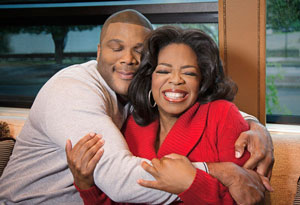Oprah Talks to Tyler Perry
The Exclusive O Interview

Taking time for a hug on Perry's tricked-out tour bus
The director, playwright, and actor is the first black studio mogul in American history—but 14 years ago he was living in his car. Perry sits down with Oprah to talk about his journey from struggling artist to superstar.
It doesn't surprise me that Tyler Perry and I have become close friends in recent years. There's a similarity in our paths: Each of us has been on a journey that can only be called a miracle. Tyler, 41, grew up in New Orleans, in a physically abusive home. Outside the home he was also sexually abused, as he recently revealed on my show. The trauma left him confused and angry—one especially "nasty" outburst got him kicked out of high school—but he found an outlet in writing about his life.
In 1992 Tyler moved to Atlanta with the dream of staging his first play. When that effort failed (and failed, and failed, six times over), he was left homeless, disheartened, and broke—but not broken. He kept on pursuing his dream, and in 1998 it finally took flight, when hundreds of mostly African-American fans lined up to buy tickets for the seventh staging of the show he'd devoted his life to, I Know I've Been Changed.
Since then millions of people have turned out to see Tyler's work. His first movie was 2005's Diary of a Mad Black Woman, adapted from his 2001 play and featuring his most famous character, the outspoken, gun-toting, 66 grandmother, Madea. After his second film, Madea's Family Reunion, he opened Tyler Perry Studios, in Atlanta, and went on to direct and produce seven other movies and create two successful TBS shows, Tyler Perry's House of Payne and Meet the Browns. Now he's pushing his self-honed directorial talents to a new high with a drama that debuted in early November: For Colored Girls, based on Ntozake Shange's 1975 play, For Colored Girls Who Have Considered Suicide When the Rainbow Is Enuf. When I visited him on the set last year, he was in his element, and I loved watching him. It made me so proud to see the respect everyone had for him—there was a lot of "Mr. Perry, sir" going on.
I sat down with Tyler on a rainy Sunday morning last September. He was in Washington, D.C., to perform in Madea's Big Happy Family, and we met up in a parking lot, in his favorite place to unwind on the road: a double-wide mahogany-paneled bus, complete with kitchen, sitting room, two bathrooms, and bedroom. "This is my home away from home," he told me. "I love having this bed. And now I don't have to worry about getting bedbugs when I travel, 'cause I have my own mattress!"
The fact that Tyler's work began with a play he scribbled in a notebook—and that he has grown it into such a powerful bond with so many millions—still blows me away. When I'm near him, I have the same experience I had back when I first went to one of his stage productions: I leave feeling more connected to others, like I just came from church.
Start reading Oprah's interview with Tyler Perry
Photo: Rob Howard



